EQUINE WELFARE NETWORK PROFILE
Mini Therapy Horses
https://www.minitherapyhorses.com

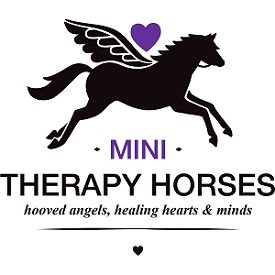
Mini Therapy Horses
26500 Agoura Road Suite 102-460
CALABASAS, CA 91302
*Physical address available on request.
Phone: 818-917-0214
MAKE AN INQUIRY
View our WEBSITE
EIN: 47-1664974Founded: 2008
View our PHOTO GALLERY
Profile Last Updated January 10, 2026Public Charity

2025
The Guardian Seal of Transparency is awarded annually to recognize an organization's commitment to transparency and accountability by their willingness to make comprehensive data about their programs, horse care practices, and governance available for public scrutiny. The Guardian Seal of Transparency is NOT an endorsement.
Awarded Annually
Last Updated: November 30, 2025
Last Updated: November 30, 2025
Mini Therapy Horses has not attained the Guardian designation for 2026.
MISSION & PROGRAMS
Mission:Founded in 2008 by Victoria Nodiff-Netanel, Mini Therapy Horses works closely with hospitals, facilities and other organizations across Los Angeles to provide Animal-Assisted Support Programs (AASP) outreach to those who need it most. Whether comforting children bedside after surgery as they come out of anesthesia or visiting with a veteran who just wants to sit quietly and share space with one of our horses, the MTH team is there to bring a sense of calm, comfort and happiness.
Our organization provides outreach and/or public education programs involving horses.
100% of our total programs and services are equine-related.
Our organization is directly responsible for the care and shelter of equines involved in our programs.
Our organization does not CURRENTLY use satellite, overflow, foster, and/or outreach facilities.
Please describe what steps your organization takes to ensure that:
1) all interactions between your equines and people are mutually beneficial and conducted in accordance with the Guidelines for Human-Equine Interactions stated below;
2) all equines in the care of our organization and/or equines that participate in the organization's program have access to clean drinking water at all times; nutritious food in sufficient quantity, including natural forage such as pasture grass and/or hay; appropriate veterinary, farrier, and dental care; shelter and protection from the weather; sufficient safe space to move around comfortably on a daily basis; and daily opportunity to freely interact and have contact with other equines:
1) As we continue working in our 17th year of service, Mini Therapy Horses is proud to have maintained a 100% safety rating from the very beginning. Our dedication to upholding a rigorous set of training standards for both our horses and volunteers have resulted in countless safe, positive, and mutually meaningful interactions during our visits.
The success of MTH’s comprehensive training program lies in its foundation of utilizing positive reinforcement and its prioritization of horse welfare. Each horse is treated with kindness and compassion throughout the entire training process, and progresses through the training scale at her own individualized pace. Each step is designed to cultivate happy, healthy, confident equines capable of performing outreach.
Before entering the field, each of our horses must master a set of commands. Respecting personal space, accepting grooming, hugs, and attention, relieving themselves on cue, are requirements of our training program to begin visits. While those core standards are essential to provide safety for all, our horses also learn fun and engaging tricks over time that enhance the experience for everyone involved, including smiling, giving high-fives, “hi ho silver!” (Standing on their hind legs), kicking balls, playing the keyboard, and more.
Our team of volunteers undergo highly specific training as well prior to beginning outreach. Categorized into handlers and helpers, each type of volunteer must master a specific set of standards. Most of our volunteers begin in the role of helper. Even though our helpers do not directly handle our horses, they play a very important role in our organization. Helper duties include organizing the barn, preparing equipment for visits, and educating the public about the history of miniature horses, fun facts about each of our mares, and proper horse safety measures. Handlers, other hand, are directly in charge of a horse on visits. Most of our handlers possess horse-related experience prior to volunteering for Mini Therapy Horses. However, volunteers still must complete our specialized training program prior to earning a role as a handler, which includes basic horse care, grooming, leading, cueing behaviors/tricks, and monitoring each horse’s expressions to identify stress.
Once trained, our horses and volunteers are ready to begin outreach. Our calendar is consistently full, but we guarantee that none of our horses are overworked. Typically, each mini participates in one visit per week, and if scheduled for a second, visits are never on consecutive days. Adequate rest and downtown to just be a horse are essential to maintaining our minis’ well-being and enthusiasm for her work.
Prior to departing for a visit, each mini is meticulously groomed and inspected by our founder, barn manager, and volunteers for any physical or behavioral abnormalities that may prevent a positive experience. Once deemed ready for work, the minis are loaded into one of our fully customized vans, providing them the safest possible mode of transportation to travel to the designated outreach location. Each van is also fully equipped with a first aid kit, should a mini need care due to accidental injury.
At the visit location, our mares are unloaded, dressed in their blankets and boots (which ensure they do not slip on indoor flooring), and taken to relieve themselves by a handler. During visits, handlers carefully lead the minis to each person who wants to meet them, show off their exciting tricks, and answer questions. Helpers also greet people and keep a watchful eye over all interactions to be sure that a proper distance and safe space is given to each horse. Most importantly, all volunteers monitor the behaviors of the horses for any signs of distress or needing a break. At the first sign of distress, the mini would be immediately taken outside fora break or relieved of duties altogether.
Throughout the entirety of our visits, volunteers remain attentive to the body language and vocalized needs of each person involved. While most individuals are thrilled and excited to spend time with our horses, others are much more reserved. Our volunteers are always happy to patiently assist anyone experiencing nervousness, and will never force interactions, which would only lead to distress for both the people and horses involved.
Mini Therapy Horses was established to share the magic, love, and joy of miniature horses with the most vulnerable members of our community. What makes meeting these goals possible is ensuring that our horses and the people we meet are mutually joyful and safe. Our organization always prioritizes the welfare, health, and happiness of every being, both equine and human, whether they are providing or receiving our outreach.
2) While Mini Therapy Horses is widely recognized for the meaningful impact of our outreach programs, we are equally proud of the work we do behind-the-scenes each and every day to ensure that all of our hardworking horses are healthy, happy, and safe. Conscientious planning and design of the MTH Ranch facilities, which include a barn, turnout, round pen, and grooming/wash rack, optimizes horse health and provides comfort, socialization, and adequate free space.
The barn contains a feed/tack room and individual stalls for each horse that are equipped with automatic waterers, salt blocks, and comfortable bedding over rubber mats. Fans, overhead heaters, and a misting system ensure our horses are comfortable inside the barn no matter the weather. On a typical day, however, our horses are only inside the barn to rest overnight and to eat their meals during the day, which are customized for each horse. While soaked hay pellets and forage are the basis of everyone’s diet, supplements are added individually for each mare’s unique needs.
The turnout provides ample space for all nine horses to socialize, play, and nap in the sun for at least 10-12 hours per day. Rubber mats and abundant rice hulls provide a soft, safe surface for our minis to spend their free time with each other as they please. Access to the turnout is only prohibited by unsafe weather. Multiple automatic waterers in the turnout provide our minis with clean, fresh water around the clock.
To maintain their overall fitness, our minis are exercised 4-5 days each week. Walks throughout the neighborhood and directed training in the properly-groomed round pen provide our horses with healthy movement to supplement their turnout time. Horses are also groomed daily, which is not only an enjoyable experience for the horses, but an opportunity for each horse to be checked for any health-related irregularities.
On a daily basis, our horses are primarily cared for by our full-time Barn Manager, who has been with us for many years and understands each mini’s needs and personality in great detail. Our Barn Manager’s duties include feeding, checking and cleaning automatic waterers, mucking the stalls, turnout, and round pen, exercising the horses, grooming, bathing, clipping, blanketing, administering medications, and monitoring health and behaviors for any signs of illness or distress. Our founder and volunteers are also heavily involved in the daily care of our equine team every day, and a camera-monitored security system makes certain that eyes are always on our horses in case they need additional or veterinary care.
Oftentimes, many people believe that just because they are smaller, miniature horses are easier to care for than larger equines. This could not be farther from the truth! All of our minis require the same care as regular-sized horses including monthly hoof trims, vaccinations and fecal exams in the spring and fall, and twice-yearly dentals. Additionally, Mini Therapy Horses never hesitates to contact our veterinarians when our horses need to see a specialist or receive emergency care. Our relationships with our farrier and team of veterinarians have spanned many years, and we put our full trust into their abilities to keep our horses as healthy as possible.
The daily care of our horses serves as the foundation of the work we do. Without happy, healthy horses, we would not have a team of incredible equines that change lives for the better each and every day. Mini Therapy Horses is grateful for the opportunity to be considered for Equus Guardian designation, which recognizes the meticulous care and management we provide for our horses.
Outreach and/or Public Education:
At Mini Therapy Horses, outreach is the core of our work. Promoting and advancing the equine-human connection is our essence, and with each visit we witness first-hand the power of this healing connection. Because our highly trained horses are so small, we can take them to many different places, including hospitals and other indoor settings. This allows us to reach thousands of people each year, many of whom have never experienced the beauty and wonder of a interacting with a horse. Additionally, because of their small size, our horses are much less intimidating than a regular-sized horse. This immediately puts people at ease and creates a more welcoming environment, especially for children and those who have not been around horses. The pure delight we see in people at these visits is immeasurable. Our horses are beautifully groomed and love to pose for photos with people. They also do a number of “tricks” that not only entertain, but show the public their high level of intelligence. These tricks also serve as aides to empower our visitors and deepen the connection they form with our horses. And, of course, there are always plenty of mini horse hugs to go around! Seeing a child’s face light up when they wrap their arms around one of our mares in a hug is pure magic.
Mini Therapy Horses conducts regular visits at Shriners for Children Medical Center in Pasadena, Ronald McDonald House in both Pasadena and Los Angeles, the Department of Children and Family Services Juvenile Court, UCLA Ronald Reagan Medical Center, UCLA Santa Monica Hospital, the Greater Los Angeles Veterans Hospital, the Los Angeles Fire Department, the Los Angeles Sheriff's Department and L.A. Family Housing, amongst others.
We have created a set of training and safety standards that far exceed those of traditional animal-assisted service organizations. All of our horses are trained with safety in mind. They are able to go up/down stairs, ride in elevators, are desensitized to all surroundings they might encounter on any given visit, and are potty trained. Under the steady lead of their handlers, our horses are able to safely navigate their environment, whether it’s maneuvering around delicate medical equipment at a patient's bedside or standing carefully next to a wheelchair. In addition to basic commands, our horses are also trained to do tricks. They smile, give high fives, play the keyboard and, the biggest crowd pleaser of them all, perform “Hi Ho Silver,” where they stand up on their hind legs. When we teach the patients how to do these commands using their voice or a hand motion, the tricks serve as a tool that connects them to the horse. Engaging in this activity helps the patient instantly feel more confident, accomplished and bonded.
Every year, our team of highly trained miniature service horses and volunteers provides outreach to thousands of children and adults who are in need of hope and healing. Some days we visit with individuals undergoing medical procedures, while other days we visit with veterans who suffer from PTSD. There are times when we’re with people overcoming substance abuse, and then sometimes we provide support for those suffering from emotional trauma following a mass casualty event. No matter the day, no matter the need, Mini Therapy Horses is ready and willing to be there for those who need us most.
Psychotherapy/Counseling (Mental Health) Populations served:
1) Greater Los Angeles Veteran’s Hospital: MTH assists the Certified Mental Health Rehabilitation Specialist during therapy with patients in the lockdown psychiatric unit. The equine interaction promotes more social interaction which aids in alleviating depression, increasing focus, and navigating group settings. These interactions focus on physical contact with the horse, which is very therapeutic for patients who are isolated and depressed, bringing them joy and a sense of relief. Often, these patients open up and reflect on childhood memories about their own experiences of being close to an animal. The horse is the vehicle of the physical interaction and discussion. The doctors and advocates say that patient interactions with the horses allow them a way to break the ice with patients. Discussing the miniature horses opens a window into patients who are unresponsive.
2) Cliffside Malibu Residential Rehabilitation Program: MTH assists LMFT’s and LVN’s by providing support alongside Counseling to clients undergoing treatment for alcohol or drug addiction.
3) Area Universities, Colleges, and Pre-K-12 Schools: MTH works with school counselors, teachers, and psychologists to help students during times of stress- from finals to traumatic events, such as the loss of a teacher in the 2017 Las Vegas Shooting and the loss of homes in the 2018 Woolsey Fire. Alongside their counselors and our miniature horses, students find the ability to open up and process their loss and sadness. We have ongoing programs with UCLA and USC. The simple act of petting a miniature horse releases an automatic relaxation response. Our outreach programs help lower anxiety, reduce loneliness, increase mental stimulation, provide a happy distraction, and reduce the initial resistance that might accompany working through trauma.
4) LA Mayor’s Crisis Response Team: Members of MTH have completed intensive training to become certified Crisis Response Team Members. MTH is on call 24 hours a day to respond to traumatic events in the City of Los Angeles. Effective on-scene compassion and support utilizing our miniature horses help “contain” the impact of the traumatic event, such as car accidents, suicides, infant deaths, and homicides. MTH provides follow up visits as well to support survivors. This in turn helps survivors begin a path to rebuilding healthy, fulfilling, productive lives, rather than down a path to despair, substance abuse, school failure, job loss, family breakup, and other problems.
5) Shriner’s for Children’s Medical Center: MTH works with medical staff to decrease patient anxiety and fear before and after procedures and clinic visits.
6) UCLA Health Care System: MTH partners with the UCLA People Animal Connection to provide support to patients, Staff, and visitors at the UCLA Medical Centers. Our horses provide positive interaction, comfort, and relief.
7) Los Angeles County Department of Children and Family Services Juvenile Court: MTH works with Social Workers and Child Life Specialists to provide outreach to high-risk children before and after they appear in Juvenile Court to testify against their abusers. Double leash walking, hugging, petting, brushing, and playing games like soccer with the horses or holding a keyboard that the horses play are just some of the interventions used. Our horses bring comfort and hope to these children in need.
8) Veterans Home of California - West Los Angeles: MTH works with staff to comfort the residents, most of whom are elderly and suffer from a variety of medical issues, including physical limitations, PTSD and dementia. Our horses help patients feel less isolated, more social and provide a sense of calm and peace.
9) Sheriff’s Youth Foundation of Los Angeles County - MTH provides outreach for 16 different Sheriff’s Youth Foundation centers. Our primary goal with SYF is to empower the children to lead—both literally and figuratively! We teach the children to lead, groom, and interact with our horses, inspiring them to pursue leadership roles and participate in uplifting their communities.
Occupational Therapy/Physical Therapy/Speech-Language Pathology Populations served:
1) Ronald McDonald Houses: MTH works with Child Life Specialists to provide emotional support to children undergoing treatment for cancer and other life-threatening illnesses.
2) Shriner’s for Children’s Medical Center in Pasadena: MTH works with OT and PT caring for children undergoing complicated medical procedures, including surgeries and treatment for scoliosis and limb prothesis. Therapists incorporate the miniature horses into specific exercises to meet individual patients’ therapeutic goals. Even via Zoom, the horses motivate the children to participate in their therapy. For example, a child rolls a ball towards the computer screen where she reaches out as directed to touch the horse’s nose/muzzle. This exercise helps strengthen the muscles in the child’s back and improves her balance.
Interacting with our Miniature Horses is a great motivator for children who are reluctant or shy to participate in therapy with their providers. We have small brushes that fit perfectly in a child’s hand; the act of brushing a horse is excellent occupational therapy. We work with double leash walking, where a horse-handler and the child jointly walk one of the horses. The child, with their walker or in their wheelchair, hold one of the leads and the handler has the other, ensuring safety and control with the horse. This simple act reaps huge benefits. The children feel empowered, confident, and proud all while having fun in a way that distracts them from their current situation.
Academic Learning, Self-improvement, Wellness, Team Building, and/or Personal or Professional Coaching Outreach Populations served:
1) Area Universities, Colleges, and Pre-K-12 Schools, Greater Los Angeles Veterans’ Hospital, Ronald Reagan UCLA Medical Center, Shriners’ for Children’s Medical Center: MTH works with medical staff (physicians, nurses, ancillary staff) and educators in our local schools to provide support, team building, and de-stressor events.
2) Library Program: MTH works with several librarians in the LA Public library system as well as teachers in our local public schools as part of their literacy program. Our miniature horses’ involvement creates a special and magical event for parents and children, which in turn creates important, positive memories about reading and libraries, thereby inspiring children to read. We also talk about the importance of volunteering and caring for others in our community, and how our horses make a difference in peoples’ lives.
3) Sheriff’s Youth Foundation of Los Angeles County - The SYF motto states: "Lead, empower, inspire!” Our outreach goals in partnership with SYF center wholly on this motto—We help foster self-improvement in children in the SYF centers by teaching them confidence, leadership, and collaboration.
We also participate in a variety of community events throughout the year. This includes Fleet Week, veteran appreciation events, community preparedness events, orphanage outreach, and speaking engagements at local schools and libraries. One of the highlights of our year is marching in the world famous Rose Parade, which we have done six times (and counting!). Sharing our mission with 700,000 people live, as well as tens of millions watching around the world, is such an honor, and we are humbled by how welcome we are always made to feel.
Advocating for horses and teaching others about the special nature of horses is a natural part of our work because we truly believe they have the power to change lives. Whenever we are out in public, whether it’s on a visit to a hospital or simply strolling the neighborhood on a training walk, we are constantly stopped and asked questions about the minis. We feel so much excitement when people show an interest in the horses, and we love educating others about these special little creatures. Being ambassadors, not just for minis, but for all horses, is a responsibility we welcome and we hope to inspire others when they see the compassion and joy our horses bring.
Research/Medical Use of Equines:
Our organization has never made, and would not ever consider making, equines available for research studies or medical training that involves invasive procedures and/or that which may cause pain or suffering to the equine.
Religious Affiliation:
Our organization does not promote religious education, religious purposes, or a specific religious faith or use donations for religious education or religious purposes; require participants to be of a certain faith; require participation in religious, instruction, activities or services; or require participation in prayer, worship, religious instruction or other religious activities as a condition of receiving social or secular services offered.
Auction Donation:
Our organization has never allowed, or would not consider allowing, an equine to be sold, transferred, released, or otherwise placed into possession of any person or organization that would cause or allow the equine to be sold at auction for slaughter.
POLICIES: INTAKE, ASSESSMENT & TRAINING
Prior to a horse being accepted and/or arriving at the facility, the organization has the following policies in place:The owner of a potential equine is interviewed over the phone or in person prior to seeing the equine
The equine is evaluated at its place of residence
The owner completes an application/contract which constitutes the agreement between the owner and our organization when the equine is acquired from the equine's owner other than by seizure or by abandonment
If health records are not available or are out-of-date, our veterinarian will administer appropriate vaccinations
A health certificate signed by a veterinarian and dated no more than seven days prior to arrival is provided to our organization either prior to or upon arrival of the equine attesting to the health status of the equine
Not Checked:
The owner is financially responsible for the shipping of the equine to and from the organization
The owner is financially responsible for the shipping of the equine to and from the organization
Trial Period: Check all that apply:
Equines are not taken on trial
Upon intake, the organization has the following quarantine policy in place:
The equine is not quarantined
Not Checked:
The equine is confined to a designated and separate area for isolation and quarantine at the facility for a prescribed period of time
The equine is confined to a designated and separate area for isolation and quarantine off-site for a prescribed period of time
The equine is confined to a designated and separate area for isolation and quarantine at the facility for a prescribed period of time
The equine is confined to a designated and separate area for isolation and quarantine off-site for a prescribed period of time
The typical length of quarantine is: Horses are not quarantined
Following arrival of the equine at the facility, the following is performed:
Physical examination to include temperature, pulse and respiration by a trained staff member upon arrival
Photographs are taken of each equine upon arrival at the facility and kept with the equine's health records
Physical examination by a farrier
Physical examination by a dentist
Not Checked:
Physical examination to include temperature, pulse and respiration by a veterinarian upon arrival
A Henneke Body Conditioning Score or other body conditioning score is assigned by a veterinarian upon arrival
A Henneke Body Conditioning Score or other body conditioning score is assigned by a trained staff member upon arrival
The equine is microchipped if the equine has not been microchipped
Physical examination to include temperature, pulse and respiration by a veterinarian upon arrival
A Henneke Body Conditioning Score or other body conditioning score is assigned by a veterinarian upon arrival
A Henneke Body Conditioning Score or other body conditioning score is assigned by a trained staff member upon arrival
The equine is microchipped if the equine has not been microchipped
Horses are assessed for following skills and behaviors:
Retrieval from a pasture/paddock
Leading with a halter and lead rope
Temperament, disposition and attitude, such as rated from very calm to very high spirited
Bridling
Lunging
Loading onto and unloading off a trailer
Tolerance to unusual objects and loud noises
Known vices, i.e., cribbing, biting, kicking, weaving, stall walking, etc
Grooming
Bathing
Clipping
Tolerance to multiple handlers at the same time
Not Checked:
Saddling
Mounting and dismounting
Riding at the walk
Riding at the trot
Riding at the canter
Riding by a beginner and/or unbalanced rider
Jumping
Driving (Pulling a carriage)
Saddling
Mounting and dismounting
Riding at the walk
Riding at the trot
Riding at the canter
Riding by a beginner and/or unbalanced rider
Jumping
Driving (Pulling a carriage)
Our organization has the following policies and procedures in place pertaining to the ongoing assessment of horses in its care:
Physical examination by a veterinarian at least annually
The Henneke Body Condition score or other body conditioning score is updated at least annually by the veterinarian
Vaccinations are administered at least annually
Equines at our facility may be treated by an equine chiropractor
Equines at our facility may be treated by an equine acupuncturist
Equines at our facility may be treated by an equine massage therapist
Equines at our facility may be treated by an equine nutritionist
Not Checked:
The Henneke Body Condition score or other body conditioning score is updated at least annually by a trained staff member
Photographs are taken of each equine monthly and kept with the equine's health records
Photographs are taken of each equine annually and kept with the equine's health records
The Henneke Body Condition score or other body conditioning score is updated at least annually by a trained staff member
Photographs are taken of each equine monthly and kept with the equine's health records
Photographs are taken of each equine annually and kept with the equine's health records
Our organization has the following policies and procedures in place pertaining to the weight-carrying or workload capabilities of horses/equines that are ridden in our care:
No equines are ridden; not applicable
Not Checked:
Our organization evaluates the weight-carrying and workload limitations for each equine that is ridden at least annually
Our organization maintains a written record of the weight-carrying and workload limitations for each equine that is ridden
Our organization does not evaluate the weight-carrying and workload limitations for each equine that is ridden
Our organization evaluates the weight-carrying and workload limitations for each equine that is ridden at least annually
Our organization maintains a written record of the weight-carrying and workload limitations for each equine that is ridden
Our organization does not evaluate the weight-carrying and workload limitations for each equine that is ridden
The following variables are considered in determining the weight-carrying and workload limitations for each equine that is ridden:
No equines are ridden; not applicable
Not Checked:
Equine age, weight, breed, body condition, fitness, balance, health and soundness
Equine conformation to include the top line, length of back, strength and width of loin, bone density (measured by the circumference of the cannon bone just below the knee)
Size, shape, condition and angle of the hooves
Participant weight, height, body proportions, balance, fitness and riding skills as well as behavioral issues and safety concerns
Weight and proper fit of the saddle and other equipment
Terrain and footing in the working environment
Duration and frequency of working sessions, as the frequency with which an equine is subjected to maximum weight carrying and/or workload
Nature and pace of work, repetitive or varied, radius of turns, degree of incline and regularity of footing when equine is subject to maximum weight-carrying capacity
Temperature and/or weather conditions
Seasonal impact on the equines' workload and weight-carrying capabilities and limitations
Our organization does not evaluate the weight-carrying and workload limitations for each equine that is ridden
Equine age, weight, breed, body condition, fitness, balance, health and soundness
Equine conformation to include the top line, length of back, strength and width of loin, bone density (measured by the circumference of the cannon bone just below the knee)
Size, shape, condition and angle of the hooves
Participant weight, height, body proportions, balance, fitness and riding skills as well as behavioral issues and safety concerns
Weight and proper fit of the saddle and other equipment
Terrain and footing in the working environment
Duration and frequency of working sessions, as the frequency with which an equine is subjected to maximum weight carrying and/or workload
Nature and pace of work, repetitive or varied, radius of turns, degree of incline and regularity of footing when equine is subject to maximum weight-carrying capacity
Temperature and/or weather conditions
Seasonal impact on the equines' workload and weight-carrying capabilities and limitations
Our organization does not evaluate the weight-carrying and workload limitations for each equine that is ridden
Horses provided formal training (groundwork or riding): 2-3 times per week
Additional information about our intake, assessment & training policies and practices:
We do not regularly take in new horses. We do not quarantine our new horses. We purchase all of our horses as foals from well-known, reputable breeders with whom we have a long standing relationship. Prior to shipping, each foal has undergone a full veterinary pre-purchase exam and has received all required vaccines and de-worming. Upon arrival at the MTH Ranch, if required, the equine will receive additional vaccines and de-worming.
Our horses are exercised daily, weather permitting, via walks through our neighborhood or lunging in our round pen. Every walk is an opportunity to enjoy and connect with our horses while reinforcing important skills - being confident with new noises or sights, being pet and hugged, and walking calmly alongside the trainer in all environments.
POLICIES: BREEDING
The organization has the following policies related to breeding and stallions:Our organization does not conduct breeding of equines owned or under the care of our organization.
The main facility where our organization conducts its programs does NOT breed equines.
Not Checked:
One or more of the facilities where our organization conducts its programs, including foster/temporary care facilities, breeds equines
One or more of the facilities where our organization conducts its programs, including foster/temporary care facilities, are permitted to house stallions
One or more of the facilities where our organization conducts its programs, including foster/temporary care facilities, breeds equines
One or more of the facilities where our organization conducts its programs, including foster/temporary care facilities, are permitted to house stallions
POLICIES: EUTHANASIA
The organization has the following policies related to euthanasia:Our organization will never have an equine euthanized for space
Our organization will have an equine euthanized upon the recommendation of the veterinarian if the equine is a threat to itself, other equines, or people
Our organization will have an equine euthanized upon the recommendation of the veterinarian after all reasonable treatment options have been explored
Euthanasia is done on site when possible to decrease trauma from transport
Euthanasia is done at the veterinarian's facility
Disposal of the carcass is handled within 24 hours
Not Checked:
Our organization will never have an equine euthanized under any circumstances
Our organization will never have an equine euthanized under any circumstances
The following are authorized to administer the procedure for your organization in accordance with state laws:
Veterinarian
Not Checked:
A certified euthanasia technician
Senior staff with appropriate training
Employee of animal control shelter or humane society with appropriate training
Veterinary student under the supervision of a licensed veterinarian
Not applicable. Our organization prohibits euthanasia under any circumstances
A certified euthanasia technician
Senior staff with appropriate training
Employee of animal control shelter or humane society with appropriate training
Veterinary student under the supervision of a licensed veterinarian
Not applicable. Our organization prohibits euthanasia under any circumstances
POLICIES: RE-HOMING
View Re-homing AgreementOur organization has the following re-homing (adoption/purchase) policies and procedures in place:
All potential adopters/purchasers complete a written contract which constitutes the agreement between our organization and the new owner
Not Checked:
Our organization does NOT re-home an equine to first time equine owners
Our organization will only re-home an equine to a location where another equine resides
Potential adopters/purchasers must visit our organization and be observed with the equine on site
The distance of a potential adopter/purchaser's home from our facility is a consideration for when re-homing an equine
Our organization conducts a site visit of the adopter/purchaser's facility before the transfer of the equine to the adopter/purchaser's facility
Potential adopters/purchasers are encouraged to do a short-term, on-site foster with the equine
Adopters/purchasers are NOT required to provide updates
Our organization does NOT re-home an equine to first time equine owners
Our organization will only re-home an equine to a location where another equine resides
Potential adopters/purchasers must visit our organization and be observed with the equine on site
The distance of a potential adopter/purchaser's home from our facility is a consideration for when re-homing an equine
Our organization conducts a site visit of the adopter/purchaser's facility before the transfer of the equine to the adopter/purchaser's facility
Potential adopters/purchasers are encouraged to do a short-term, on-site foster with the equine
Adopters/purchasers are NOT required to provide updates
Our organization has the following policies and procedures related to horses that need to be retired, are no longer able to contribute to the mission of the organization, and/or are no longer manageable:
Equines may remain at our organization for their lifetimes
Equines may be found suitable homes by our organization
In the case an equine is unmanageable and demonstrates repeated dangerous behaviors, the equine may be euthanized upon the recommendation of the veterinarian
In the case an equine is unsound and/or unhealthy and cannot be treated to relieve suffering, the equine may be euthanized upon the recommendation of the veterinarian
Not Checked:
Equines may be returned to their owners
Equines may be sent to auction
If a suitable home cannot be located within 12 months, the equine may be euthanized
The organization will accept financial responsibility for equines in the current care of the organization that need to be retired or are no longer able to contribute to the mission of the organization if all alternatives have been explored to find the equine an appropriate placement and space is not available for the equine to remain at the organization.
Equines may be returned to their owners
Equines may be sent to auction
If a suitable home cannot be located within 12 months, the equine may be euthanized
The organization will accept financial responsibility for equines in the current care of the organization that need to be retired or are no longer able to contribute to the mission of the organization if all alternatives have been explored to find the equine an appropriate placement and space is not available for the equine to remain at the organization.
The uploaded Re-homing agreement includes the following re-homing (adoption/purchase) statements:
The agreement reflects that any individual or organization in possession of the equine as of the date of the agreement and any time thereafter is bound to not sell the equine at auction for slaughter or allow the equine to be sold, transferred, released, or otherwise placed into possession of any person or organization that will cause or allow the equine to be sold at auction for slaughter.
The agreement states that should the adopter decide to re-home the equine, our organization must be notified of the name, address, and telephone number of any individual or organization intending to take possession of the equine for any reason prior to the equine being placed into the possession of such individual or organization.
The agreement states that if there is any breach of contract the equine must be returned to our organization
The agreement states that our organization reserves the right to make scheduled visits
Not Checked:
The agreement states that the re-homed equine CANNOT be sold, adopted, transferred, auctioned, released, given away, or otherwise placed into the possession of another individual or organization under any circumstances and must be returned to our organization should the adopter decide that he/she is no longer able, or no longer wishes, to care for the equine.
The agreement states that should the adopter decide to re-home the equine, the adopter must grant the organization first right of refusal prior to the equine being placed into the possession of any individual or organization intending to take possession of the equine for any reason.
The agreement states that should the adopter decide to re-home the equine, our organization must grant approval of any individual or organization intending to take possession of the equine for any reason prior to the equine being placed into the possession of such individual or organization, including being provided written notification of the name, address, and telephone number of any individual or organization intending to take possession of the equine for any reason.
The agreement states that the terms of our organization's agreement will be binding on any future individual or organization taking and/or in possession of the equine for any reason.
The agreement states that re-homed equines cannot be bred
The agreement states that our organization reserves the right to make unannounced visits
The agreement states that adopters/purchasers can return an equine to our organization free of charge
The agreement states that adopters/purchasers can return an equine to our organization for a fee
The agreement states that adopters/purchasers are required to provide updates (photos, vet records) for one year
The agreement states that adopters/purchasers are required to provide updates (photos, vet records) for two years
Our organization microchips all equines that are not already microchipped before the adoption and/or transfer of the equine if the organization has the authority to microchip the equine.
The agreement includes the microchip number of the equine.
The agreement states that adopters/purchasers are required to provide updates (photos, vet records) for as long as the adopter/purchaser is responsible for the care of the equine
None of the statements are included.
The organization does not re-home equines under any circumstances; our organization retains custody of our equines and ensures care of the equines for their lifetimes.
Our organization does not have the authority to transfer ownership and/or does not own any of the equines involved with our programs.
The agreement states that the re-homed equine CANNOT be sold, adopted, transferred, auctioned, released, given away, or otherwise placed into the possession of another individual or organization under any circumstances and must be returned to our organization should the adopter decide that he/she is no longer able, or no longer wishes, to care for the equine.
The agreement states that should the adopter decide to re-home the equine, the adopter must grant the organization first right of refusal prior to the equine being placed into the possession of any individual or organization intending to take possession of the equine for any reason.
The agreement states that should the adopter decide to re-home the equine, our organization must grant approval of any individual or organization intending to take possession of the equine for any reason prior to the equine being placed into the possession of such individual or organization, including being provided written notification of the name, address, and telephone number of any individual or organization intending to take possession of the equine for any reason.
The agreement states that the terms of our organization's agreement will be binding on any future individual or organization taking and/or in possession of the equine for any reason.
The agreement states that re-homed equines cannot be bred
The agreement states that our organization reserves the right to make unannounced visits
The agreement states that adopters/purchasers can return an equine to our organization free of charge
The agreement states that adopters/purchasers can return an equine to our organization for a fee
The agreement states that adopters/purchasers are required to provide updates (photos, vet records) for one year
The agreement states that adopters/purchasers are required to provide updates (photos, vet records) for two years
Our organization microchips all equines that are not already microchipped before the adoption and/or transfer of the equine if the organization has the authority to microchip the equine.
The agreement includes the microchip number of the equine.
The agreement states that adopters/purchasers are required to provide updates (photos, vet records) for as long as the adopter/purchaser is responsible for the care of the equine
None of the statements are included.
The organization does not re-home equines under any circumstances; our organization retains custody of our equines and ensures care of the equines for their lifetimes.
Our organization does not have the authority to transfer ownership and/or does not own any of the equines involved with our programs.
Our organization requires references from the following:
Not applicable or no references required.
Not Checked:
Veterinarian
Farrier
Personal/Other
Veterinarian
Farrier
Personal/Other
Transfer of ownership occurs: Immediately (at the time of adoption/purchase) or less than one year
The average equine re-homing (adoption/purchase) fee received by your organization:
Over $1,500
Additional information about our rehoming policies and practices:
We have only re-homed one horse that became too large for our program. This horse was adopted by a long time close personal friend who is also a horse trainer in California. This family had young children and it was a perfect fit for this horse. We receive constant photos and updates on this horse and are happy to see she remains healthy and happy. This is the only instance in which we have re-homed a horse. Going forward, should we need to rehome a horse, adopter(s) must sign the attached Rehoming Agreement.
EQUINE CARE & SHELTER/FACILITY INFORMATION
Our organization does not CURRENTLY use satellite, overflow, foster, and/or outreach facilities.Total facilities at which our organization cares for and shelters horses used in our programs: 1
MTH Ranch
*Physical address available on request.
Currently operational
Total number of horses/equines currently involved with your programs, under your care, and/or owned by your organization at this facility: 10
Total number of horses at this facility NOT INCLUDING those counted above: 0
Maximum capacity of horses at this facility: 10
Does your organization own, lease or use a part of this facility? Own
Provide the contact information for the individual or organization responsible for investigating abuse in the county where the facility is located, including mailing address, email address, and phone information.
LA Animal Services Animal Cruelty Task Force (213) 486-0450 or email at actf@lapd.lacity.org
Does your organization conduct Equine Assisted Services (EAS) at this facility in accordance with the EQUUS Foundation Guidelines on Qualifications of Organizations Conducting Equine Assisted Services (EAS)? No
Veterinarian Information: MTH Ranch (*Main) Currently operational
Veterinarian: Dr. Richard Stevens
Clinic Name: Conejo Valley Equine
60 Cunningham Road
Thousand Oaks CA 91362
Phone: 805-496-0505
Grounds: MTH Ranch (*Main) Currently operational
Total acreage dedicated specifically to the horses: 4
Our organization has use of the following at this facility:
Structures/Barns: 3 Run-in sheds: 0
Pastures: 1 Paddocks/Pens/Turnout Areas: 1
Uncovered Outdoor Rings: 1 Covered Outdoor Rings: 0 Indoor Rings: 0
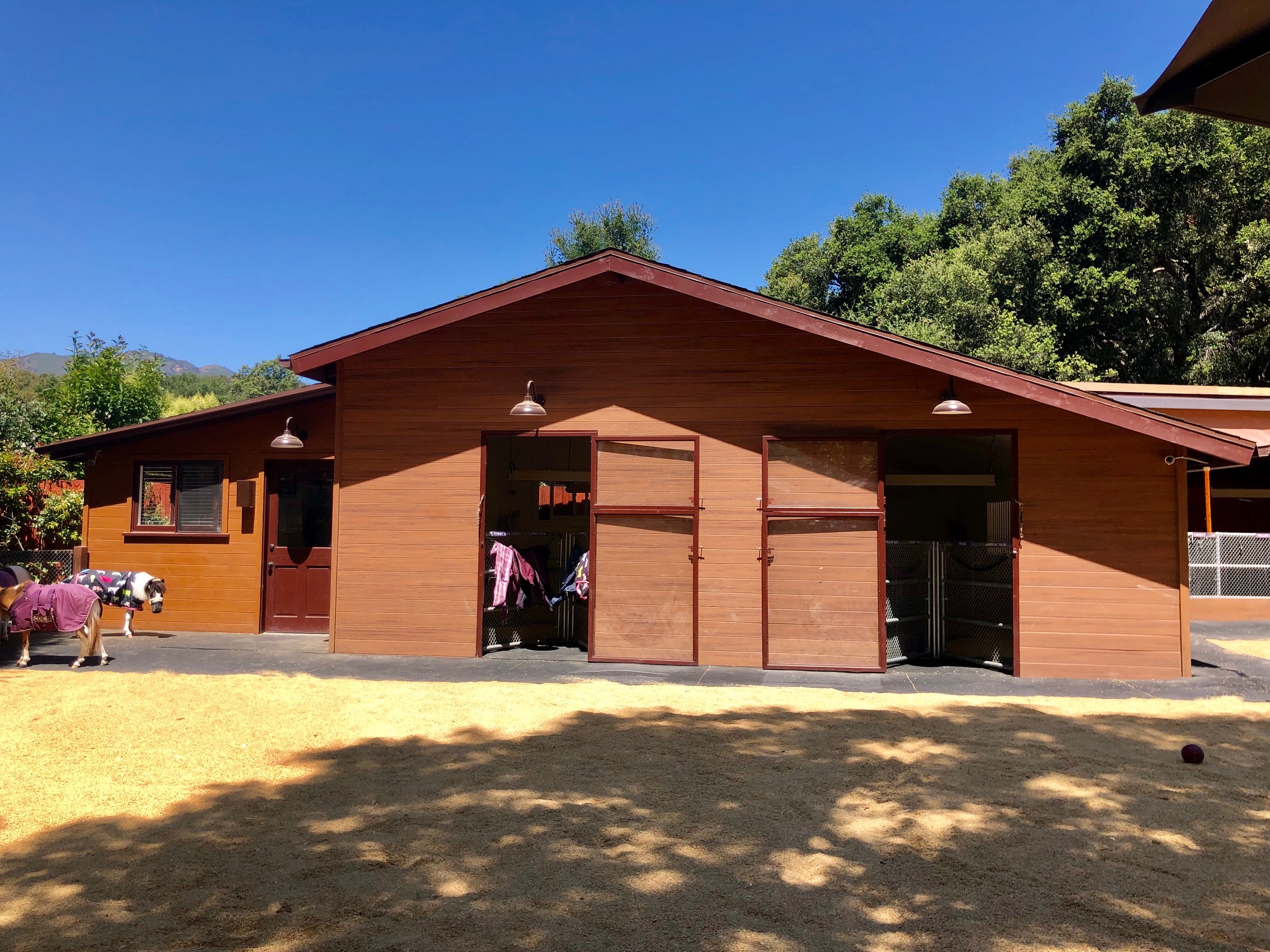
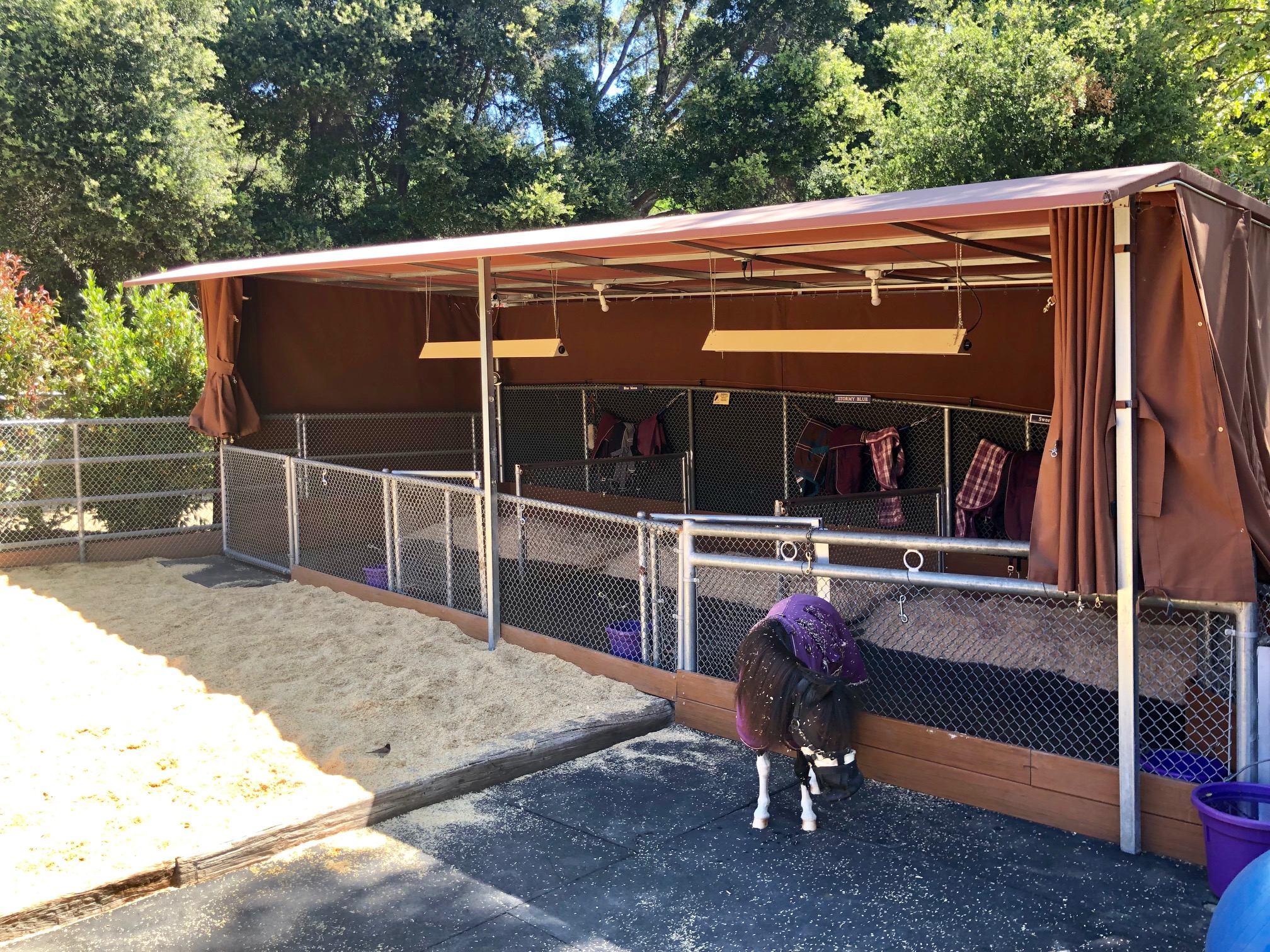
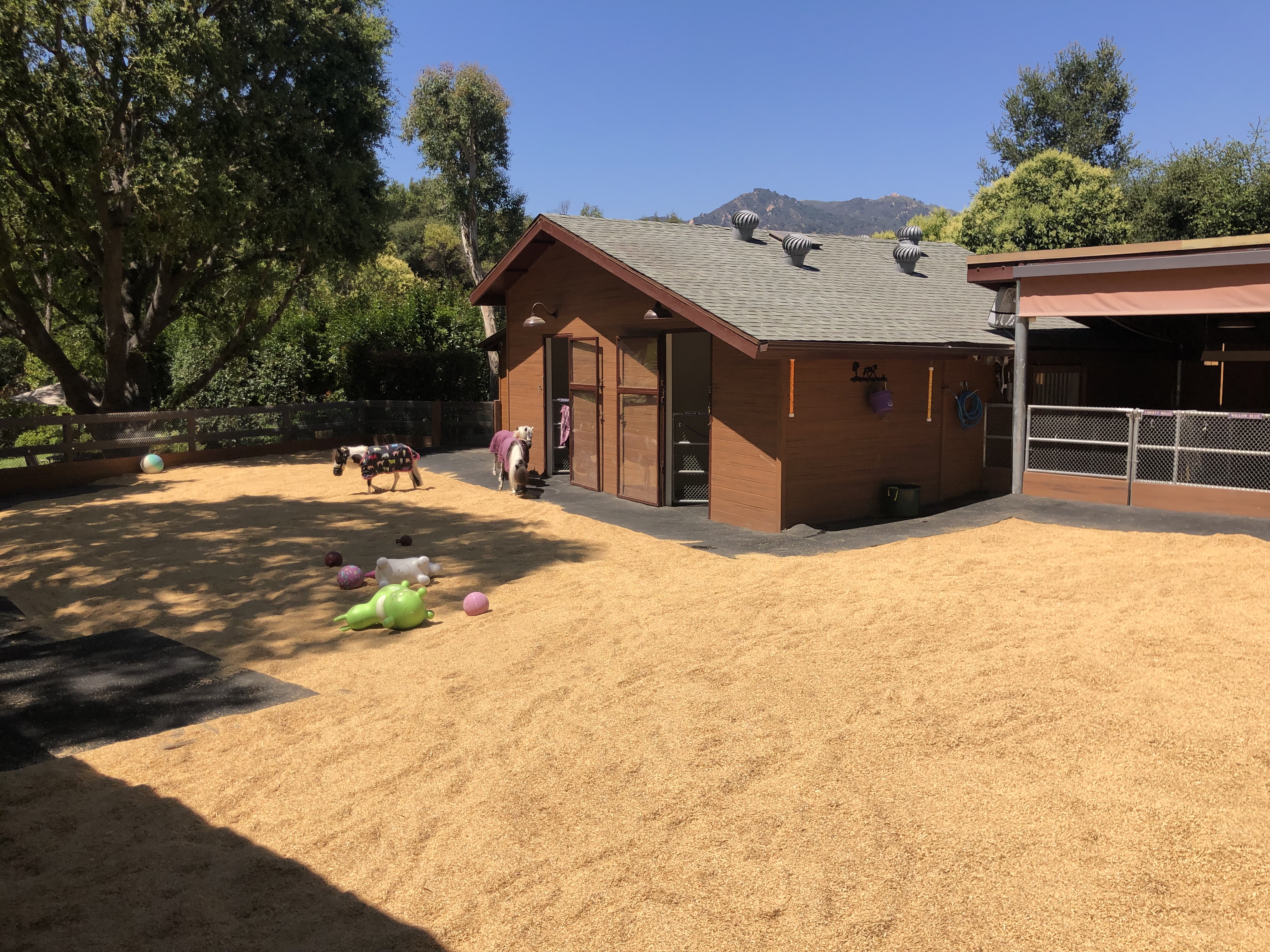
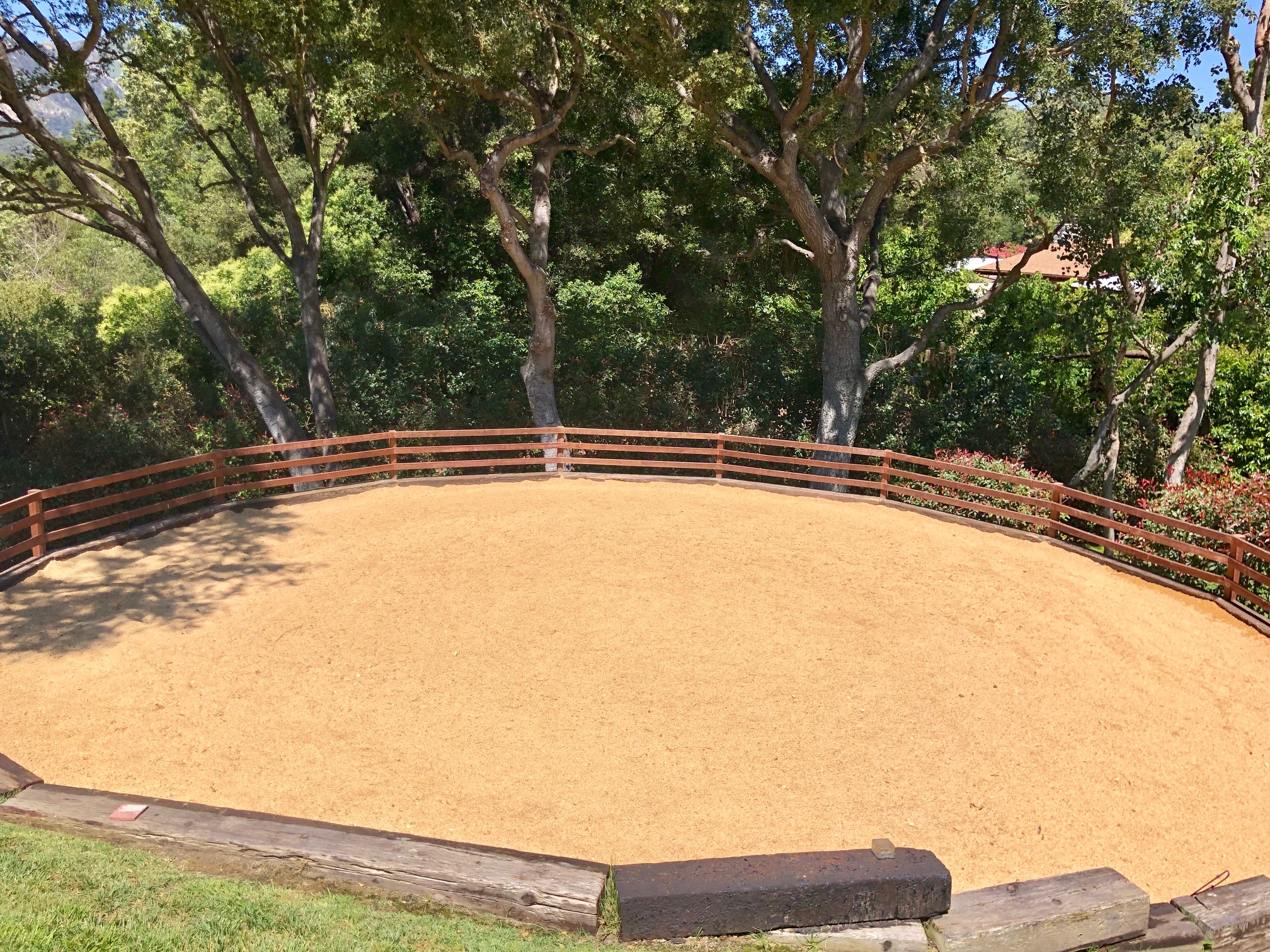
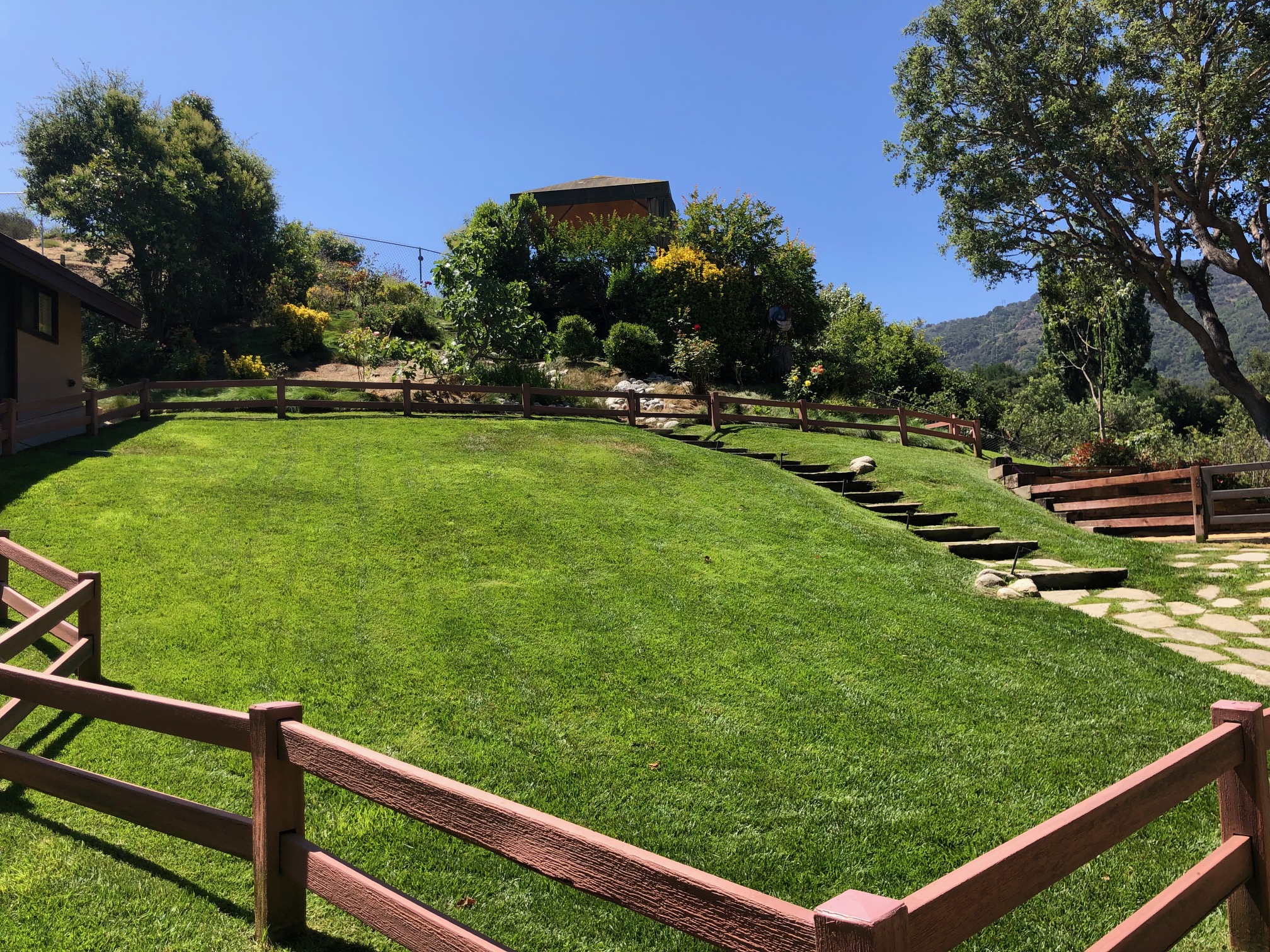
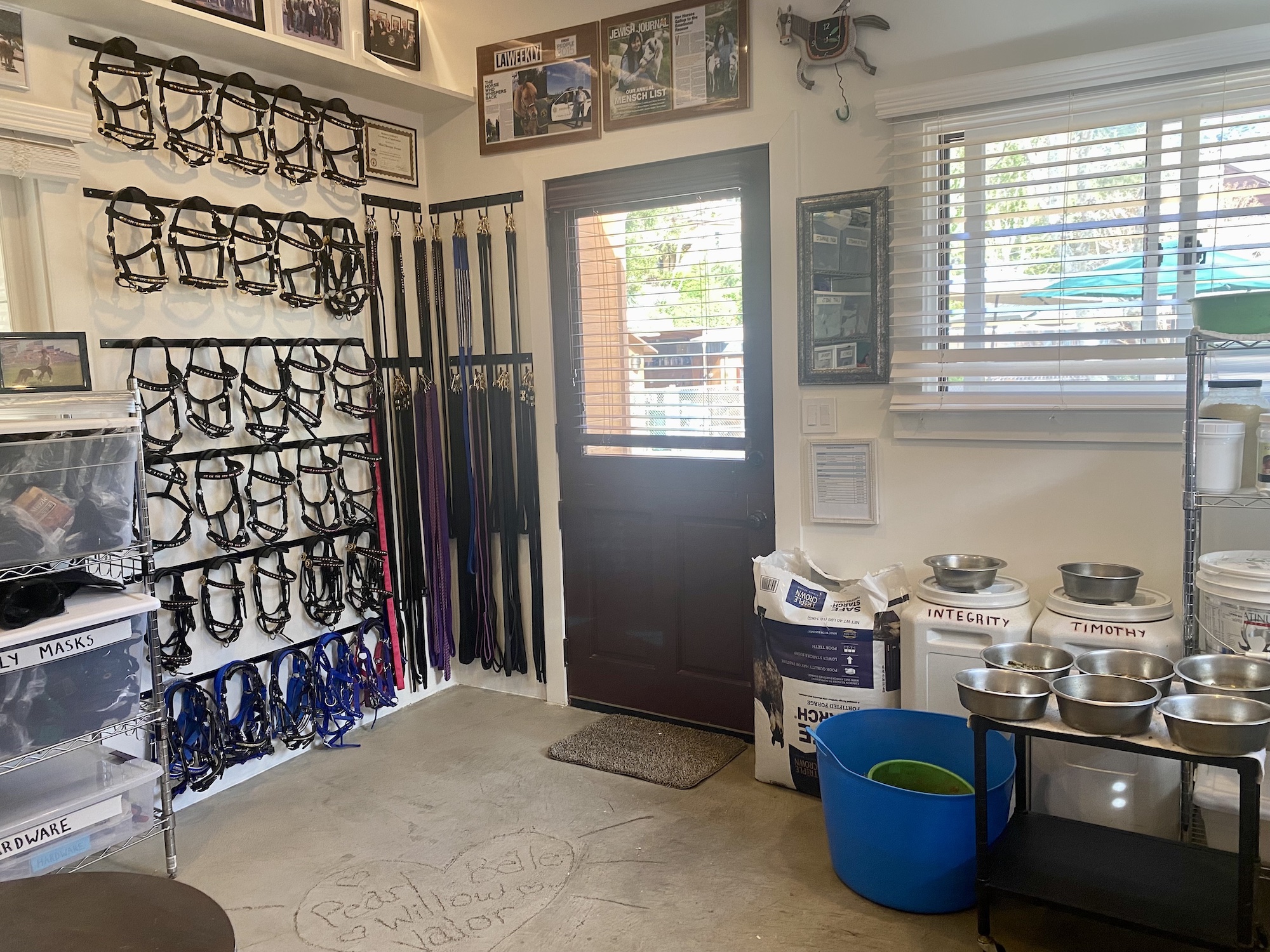
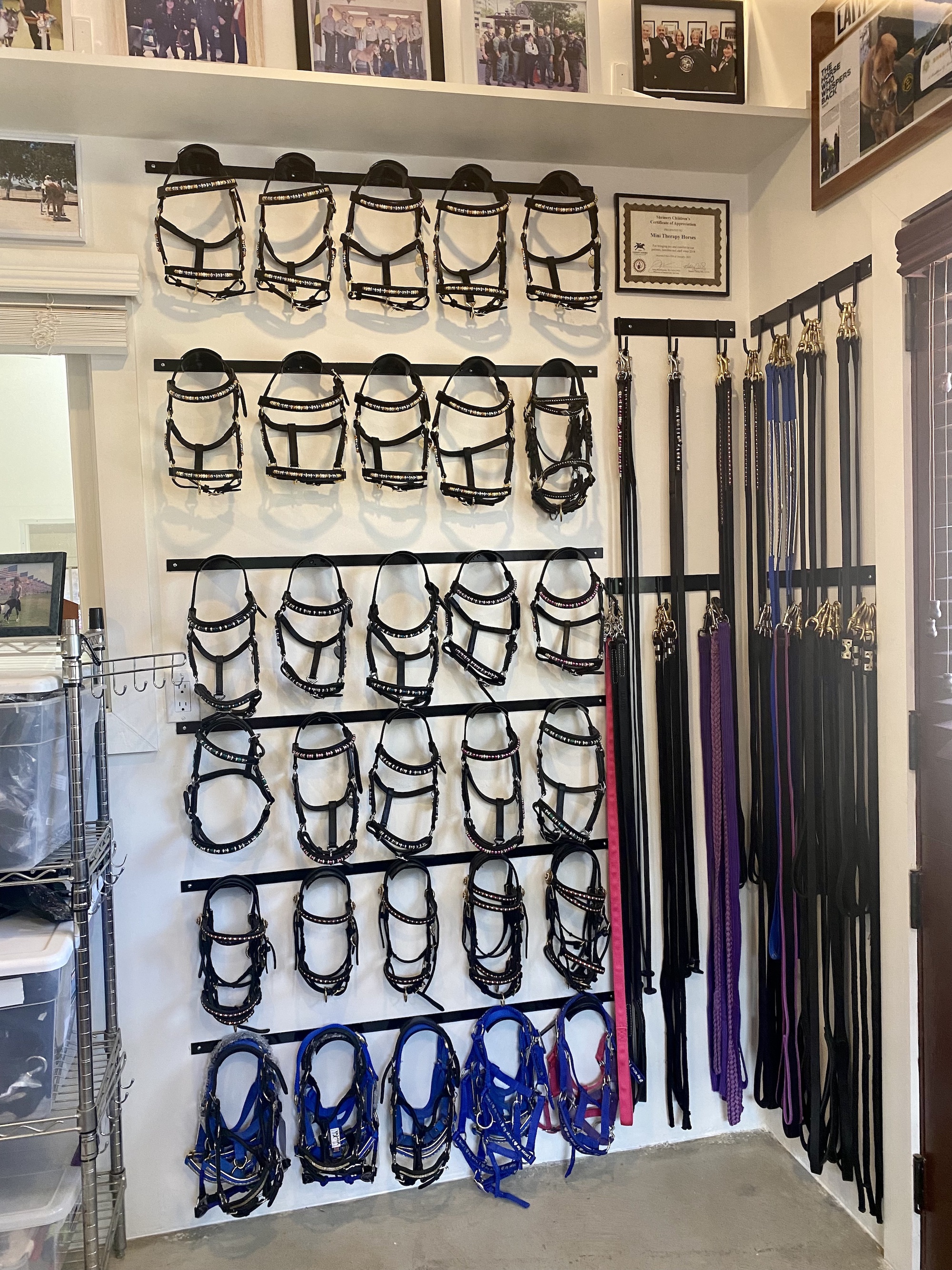

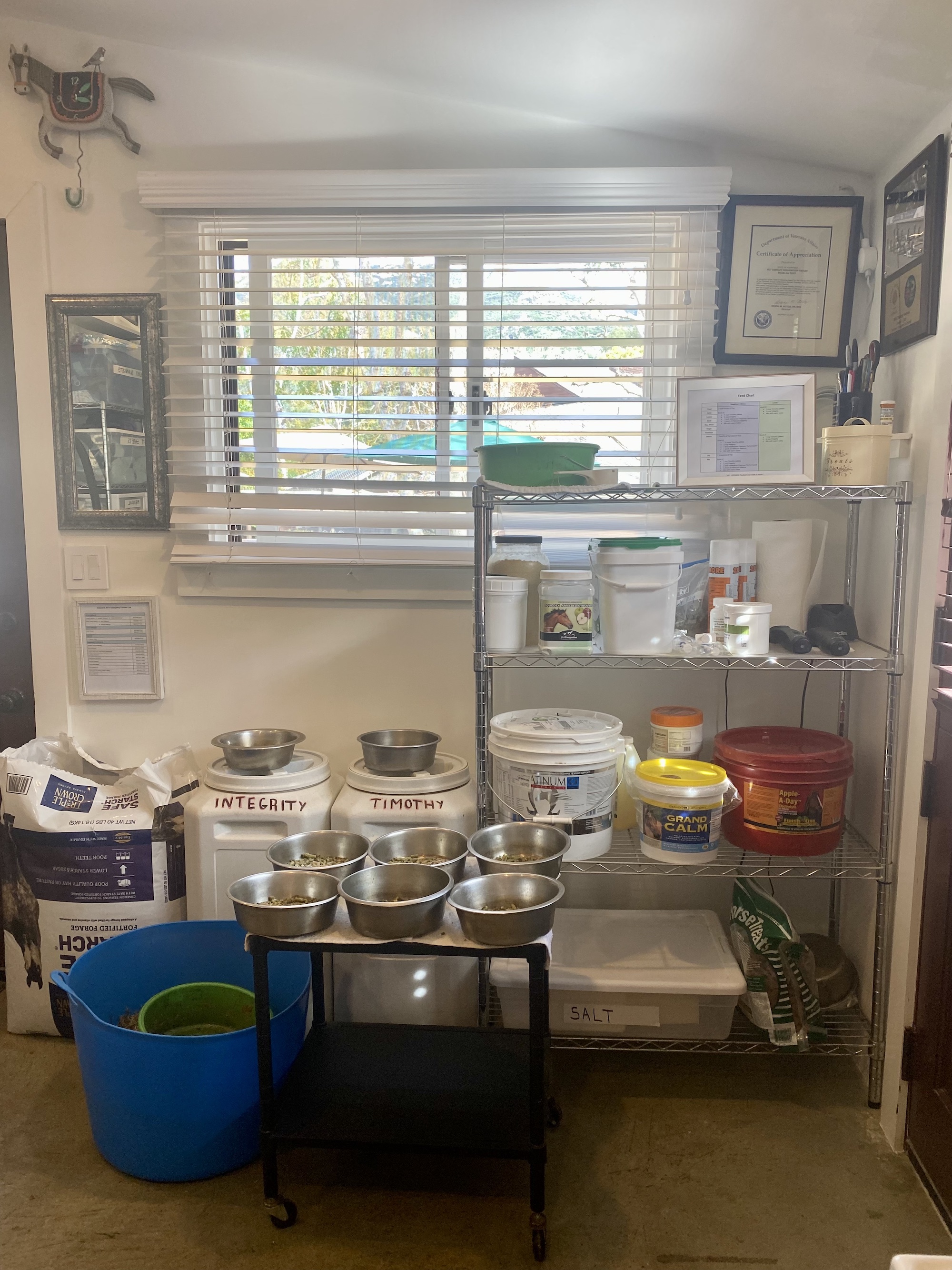
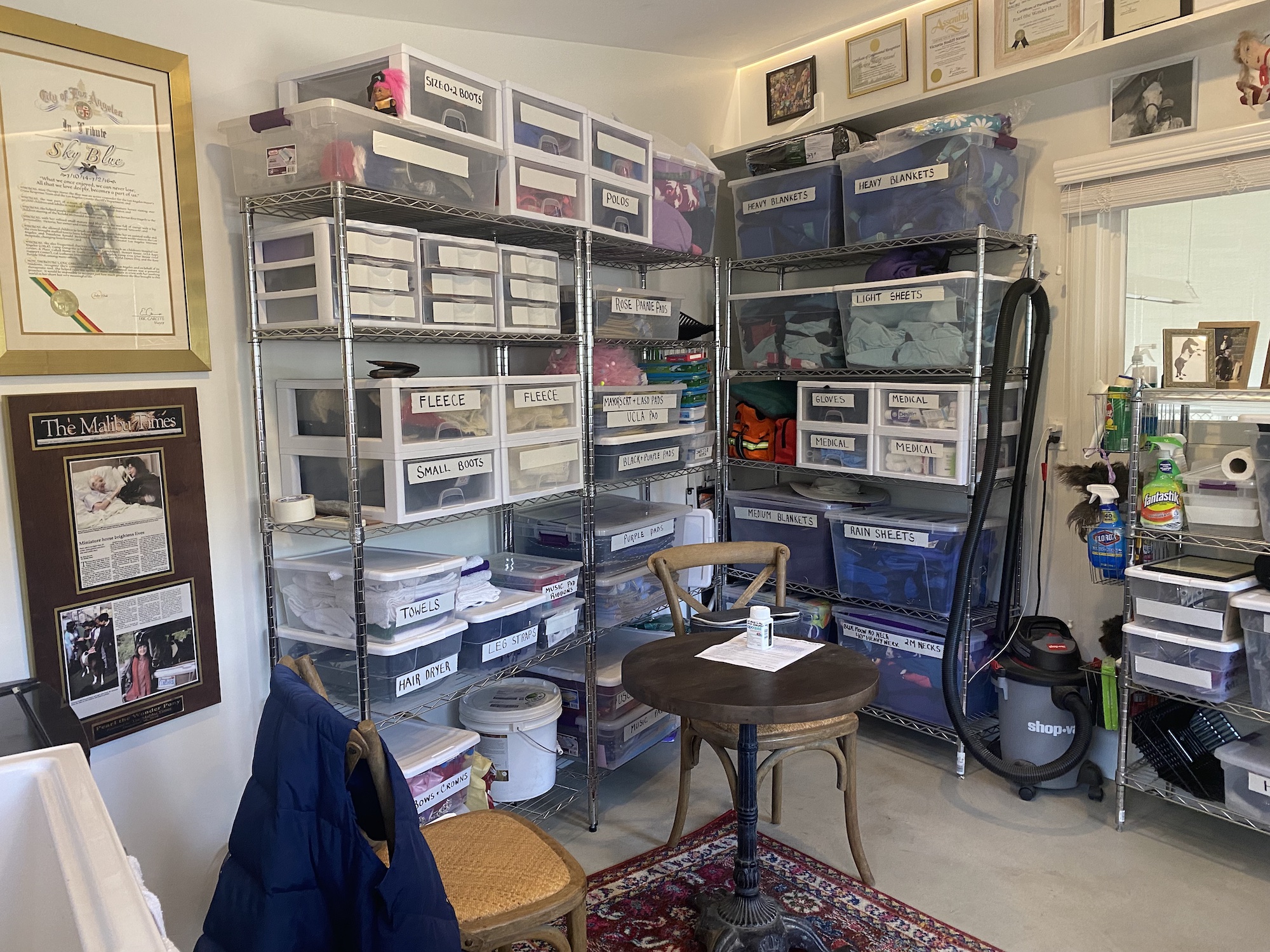

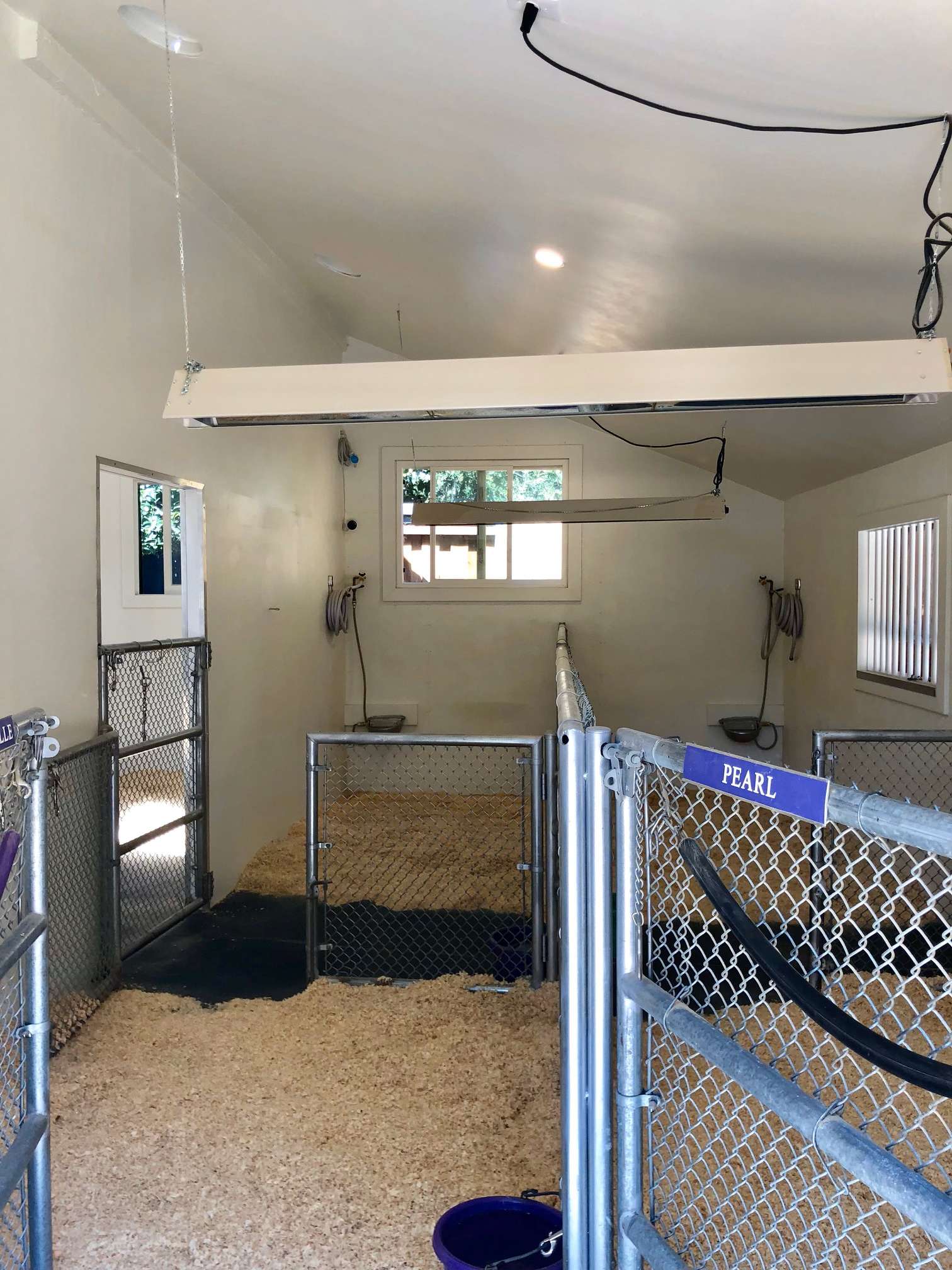
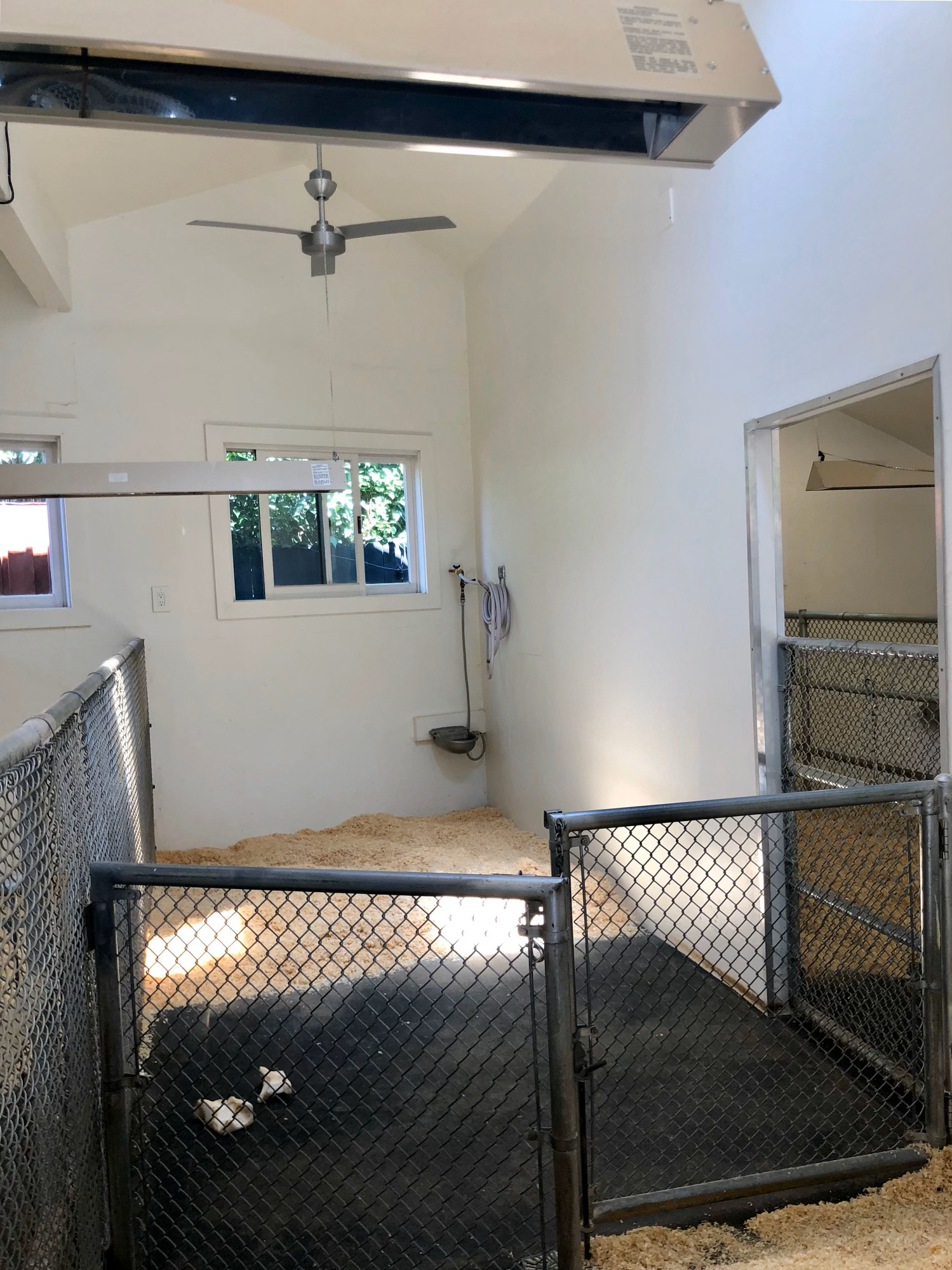
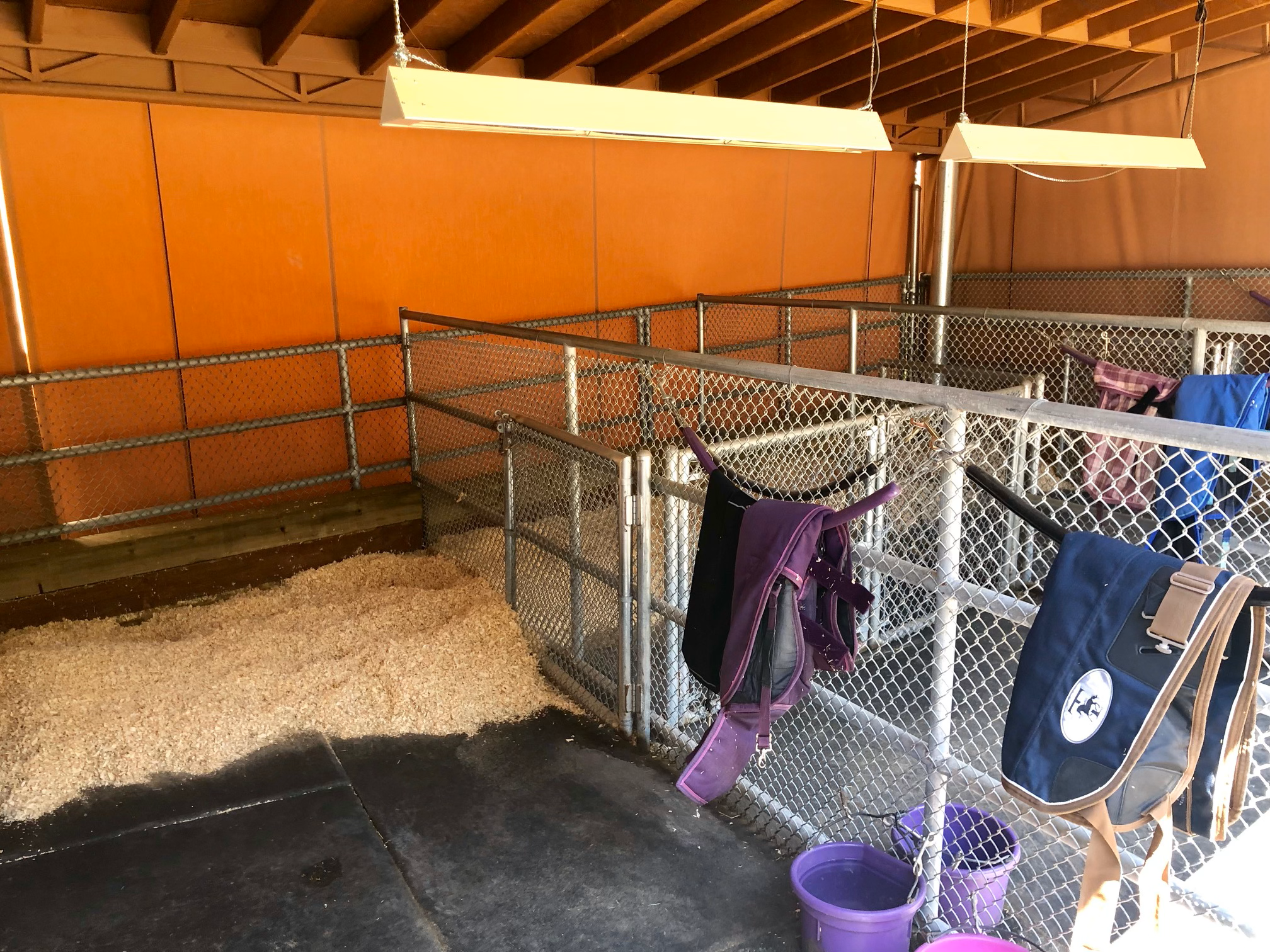
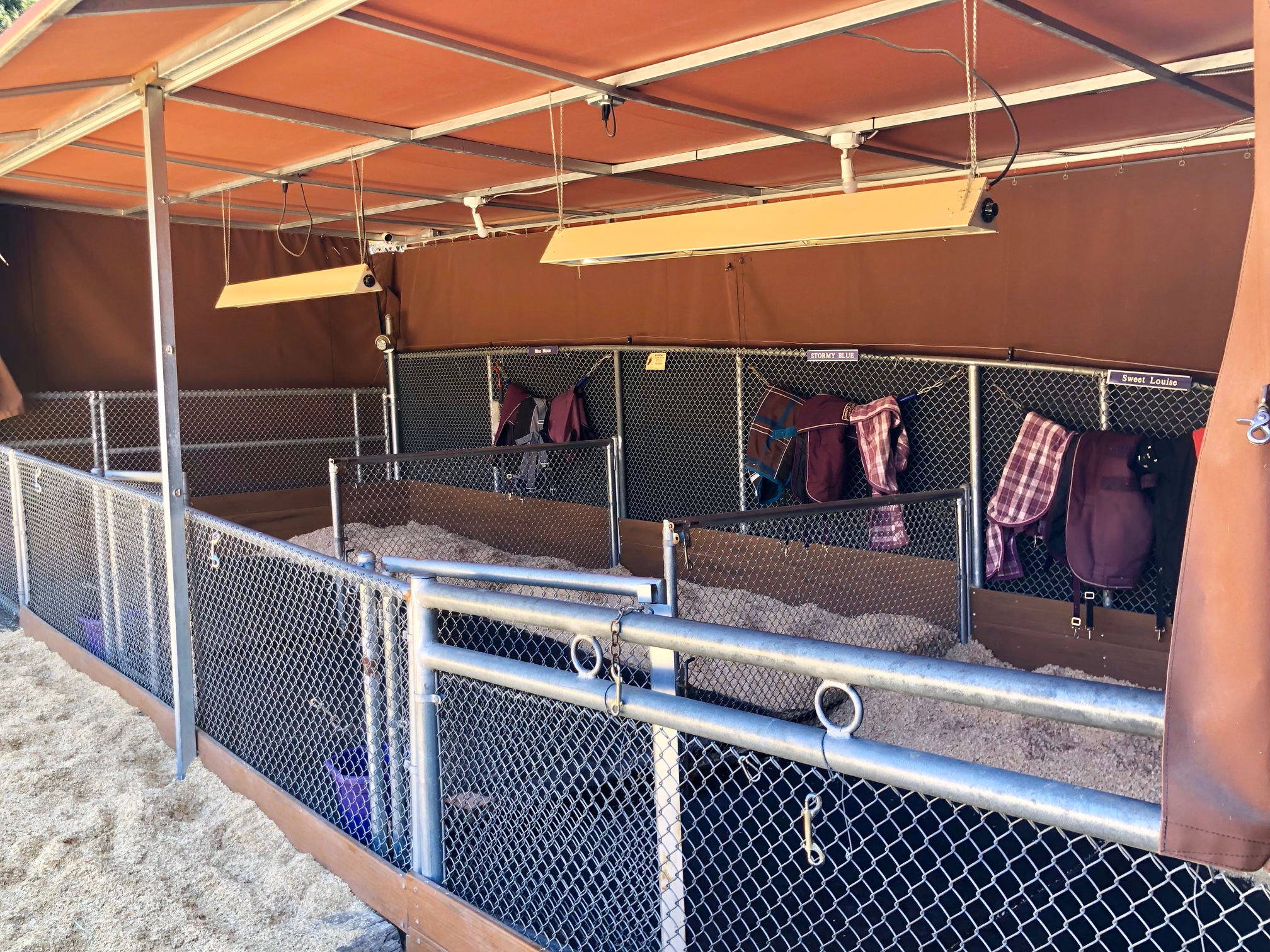
Are the organization's rules, restrictions and warnings (signage) conspicuously posted in easily accessible locations? Yes
Are the organization's emergency contacts, including veterinarian contact information, conspicuously posted in easily accessible locations? Yes
Are human and equine first aid kits easily accessible? Yes
Regarding all shelters where horses are housed including run-in sheds:
Do horses have assigned stalls in the barn/structure(s) or exclusively assigned shelter locations where they are separated from other horses with a barrier? Yes
How many hours per day, on average, are horses stalled or restricted to these sheltered exclusive shelter locations? 9-12
How often are the stalls/shelters cleaned, i.e., kept in good repair and free of standing water, accumulated waste, sharp objects and debris? 6-7 Days a Week
Do all stalls/shelters allow horses to lie down, stand up and turn around and provide protection from inclement weather (wind, sleet, rain, snow and extreme temperatures)? Yes
Are stalls/shelters kept in good repair, with adequate ceiling height, and free of standing water, accumulated waste, sharp objects and debris? Yes
Are floors constructed and maintained for both good drainage and traction? Yes
Is there a ventilation and circulation system in place to allow free flow of air to control temperature, and humidity, and to prevent air stagnation? Yes
Is wiring inaccessible to horses and maintained for safety in all areas of facility? Yes
Are fire prevention/protection measures (fire alarms, extinguishers and sprinkler systems) maintained and in good working order? Yes
Is there adequate lighting to ensure safety in all areas of facility? Yes
How many hours per day, on average, are horses turned out:
Equines are out 9 to 15 hours per day
The following describes the pastures at this facility:
This facility has a written plan in place for pasture management, which includes guidelines for seeding, fertilizing, irrigation, mowing, dragging, harrowing, manure removal, removal of debris, the control of poisonous plants, and a schedule for cleaning
A dedicated staff person(s) is responsible for pasture management
All pastures are fenced to prevent escape or injury
Fencing checks, such as broken or missing planks, loose fence posts, exposed or loose nails, detached wires, etc., are done regularly
Not Checked:
This facility does not have pastures where equines can graze on pasture grass
Barbed wire is used for fencing
Electric fencing is used; electric wires or tape fence are visibly marked
Pastures are rotated
Pastures have natural protection for equines (i.e., trees)
Pastures have man-made protection for equines (i.e., shelters)
This facility does not have pastures where equines can graze on pasture grass
Barbed wire is used for fencing
Electric fencing is used; electric wires or tape fence are visibly marked
Pastures are rotated
Pastures have natural protection for equines (i.e., trees)
Pastures have man-made protection for equines (i.e., shelters)
The following describes the turnout areas other than pastures at this facility:
This facility has a written plan in place for the maintenance of turnout areas, which includes a schedule for cleaning, manure removal, and dragging
A dedicated staff person(s) is responsible for the maintenance of turnout areas
All turnout areas are fenced to prevent escape or injury
Fencing checks, such as broken or missing planks, loose fence posts, exposed or loose nails, detached wires, etc., are done regularly
Not Checked:
This facility does not have turnout areas
Barbed wire is used for fencing
Electric fencing is used; electric wires or tape fence are visibly marked
Turnout areas have man-made protection for equines (i.e., shelters)
This facility does not have turnout areas
Barbed wire is used for fencing
Electric fencing is used; electric wires or tape fence are visibly marked
Turnout areas have man-made protection for equines (i.e., shelters)
The following policies and procedures are in place at the facility to restrict public access and to keep horses safe:
The property owner, staff member or caretaker lives on the premises and ensures that public access is restricted and is responsible for the security of the facility and equines
There is a mechanism in place to monitor equines overnight
By Appointment Only signs are posted.
No Trespassing signs are posted
Hold Harmless signs are posted
Authorized Personnel Only signs are posted
Entrance gates are locked at night
Visitors are only permitted at specific times
Visitors are only permitted in specific areas
The property is fitted with motion lights
The property is fitted with a security system monitored by police or a professional service
The property is fitted with a security system that is monitored internally by staff (or the property owner)
The perimeter of the property is fully fenced
Not Checked:
A security guard is present at night
A security guard is present at night
Equine Care/Emergency Preparedness: MTH Ranch (*Main) 2026 and 2025 This section is required.
Horse Health Care/Barn Management Records: What system is used to collect and store health/horse care records?
Notebook or equivalent (technology not utilized)
Onsite computer with cloud-based backup storage system
The organization utilizes its own system to maintain records
Our organization would use free cloud-based barn management software if available
The following items are consistent with our feed management plan and practices:
Equines are provided with individualized feeding plans, including supplements, according to the equine's age, breed/type, condition, size, work level and any health issues, consisting of nutritious food provided in sufficient quantity and access to adequate natural forage, or be fed daily, or as recommended by the organization's veterinarian
Feed plans are determined in consultation with a veterinarian
Supplement plans are determined in consultation with a veterinarian
Equines are fed grain in individual stalls
Staff and/or volunteers are trained in proper feed measurements and protocols and observed periodically to ensure they are feeding correctly
The feed chart is centrally located and updated as needed
The area(s) where hay, feed, grain, and supplements are stored are kept clean, free of debris and chemicals, and protected from weather and other animals in rodent-proof and mold-proof containers and grain bins
Feed, supplements and hay types are clearly labeled
Water sources, i.e., buckets, troughs, automatic waterers, etc. are kept clean, free of contaminants, debris and chemicals, protected from weather and other animals, and be positioned or affixed to minimize spillage.
Medications are kept in a secure area
Not Checked:
Equines are fed grain in groups
Equines are fed grain in groups
Is clean, potable water available at all times for all equines? Yes
Hoof Care: How often is hoof care provided for each equine? Every 4-8 weeks and when an issue arises
Dental Care: How often is dental care provided for each equine? Annually and when an issue arises
Horse checks: How often are equines visually and physically checked by personnel at the facility? Every day or 6 days a week
Our organization has the following parasite and fly/insect control protocols in place, including remedies used to control flies and insects:
Our organization follows the parasite control guidelines of our veterinarian, including fecal testing and de-worming
Fly/Insect Control Remedies:
Fly Traps and Tapes
Fly Spray Repellent
Fly Masks
Fly Sheets
Fans
Not Checked:
The following represent the biosecurity practices in place at facility:
Our organization follows the biosecurity guidelines of our veterinarian
Sick, affected and/or quarantined equines do not have contact with other equines or other animals
The organization has a written biosecurity plan
Staff are trained in best practices related to biosecurity
Volunteers are trained in best practices related to biosecurity
A specific individual is trained and assigned to care for sick, affected and/or quarantined equines
Sick, affected and/or quarantined equines are cared for last if the caretaker must also care for healthy equines
Restricted access signs are posted at primary points of access to sick, affected and/or quarantined equines
Hand sanitizers are available at all primary points of access to sick, affected and/or quarantined equines
Footbaths are available at all primary points of access to sick, affected and/or quarantined equines
Manure and bedding from sick, affected and/or quarantined equines is removed from the facility - not put in open air piles, and not spread on pastures
Quarantine areas, such as stalls, aisle ways, paddocks, and common areas, are cleaned (and needed, disinfected) after conclusion of the quarantine.
Trailers/vans used by sick, affected and/or quarantined equines are cleaned and disinfected after each use and cleaning takes place away from where equines are sheltered
Equipment used by sick, affected and/or quarantined equines is not shared
Equipment used by sick, affected and/or quarantined equines is cleaned of organic debris and disinfected after each use
Latex gloves, or equivalent gloves, are worn when working with sick, affected and/or quarantined equines
Equines are not quarantined on arrival.
Not Checked:
Additional information on biosecurity:
Fortunately there has never been a need to quarantine any of our horses. Should such a situation arise, we would take the horse to Alamo Pintado Equine Hospital (Santa Ynez, CA) to have it treated and quarantined. In the event that we must quarantine here at the facility, we would follow the aforementioned protocols/procedures.
The following represent the manure removal practices in place at facility:
Manure is stored in dumpster(s)
Manure is hauled, sold or given away
Our organization adheres to the manure management guidelines set by the state, local authorities, and/or our organization's veterinarian
Not Checked:
Manure is piled in an area where equines are not located
Manure piles are covered
Manure piles are composted or spread on pastures
Manure is piled in an area where equines are not located
Manure piles are covered
Manure piles are composted or spread on pastures
The following steps are taken to help staff and volunteers readily identify each horse on the property:
Equines are assigned the same exclusive stall/shelter location each day
Name plates are located on the stall/shelter location
Equines wear halters with nametags
A notebook or binder with photos and information on each equine is easily accessible
A map/diagram is posted showing the location of each equine with equine names and photos
Equine photos and profiles are available on the website
Staff and volunteers are provided with an information packet with equine profiles, including photos and detailed descriptions
Staff/volunteers are provided training on conformation, markings, colors, and breeds
Team leaders work with new staff/volunteers until they are able to identify the equines
Not Checked:
Photos are located on the stall/shelter location
Photos are located on the stall/shelter location
Our organization has the following policies and procedures in place pertaining to tack, apparel and equipment:
All equines have specifically assigned apparel, equipment and tack (saddles/bridles if ridden) that is not shared
Blankets, sheets and turn out apparel are fitted and utilized for each equine appropriate to the equine's needs and the weather conditions
Blankets, sheets and turn out apparel are cleaned regularly as needed
No equines are ridden; saddles, bridles, etc. not applicable.
Not Checked:
Saddles are shared
Saddle pads are shared
Bridles are shared
Bits are shared
Blankets are shared
Sheets are shared
Turnout apparel is shared
Halters are shared
Riding Tack is always cleaned after each use
Riding Tack is always cleaned at least weekly
Riding Tack is cleaned only when needed
Riding Tack is inspected for overall working condition before each use by trained personnel
Riding Tack is assessed for fit before each use by trained personnel
Riding Tack is assessed for fit by trained personnel when an equine's body condition changes
Riding Tack is assessed for fit by trained personnel when an equine's disposition changes
This facility enlists the services of a professional saddle fitter at least once a year
Assigned riding tack is clearly labeled
Riding Tack is stored in a climate-controlled location
Helmets are shared
Helmets are cleaned/disinfected after each use
Helmets are replaced after a fall
Helmets are replaced at least every five years.
Saddles are shared
Saddle pads are shared
Bridles are shared
Bits are shared
Blankets are shared
Sheets are shared
Turnout apparel is shared
Halters are shared
Riding Tack is always cleaned after each use
Riding Tack is always cleaned at least weekly
Riding Tack is cleaned only when needed
Riding Tack is inspected for overall working condition before each use by trained personnel
Riding Tack is assessed for fit before each use by trained personnel
Riding Tack is assessed for fit by trained personnel when an equine's body condition changes
Riding Tack is assessed for fit by trained personnel when an equine's disposition changes
This facility enlists the services of a professional saddle fitter at least once a year
Assigned riding tack is clearly labeled
Riding Tack is stored in a climate-controlled location
Helmets are shared
Helmets are cleaned/disinfected after each use
Helmets are replaced after a fall
Helmets are replaced at least every five years.
Emergency Preparedness: MTH Ranch: *Main This section is required.
The following plans, policies, and procedures are in place at the facility to handle emergencies and address weather related issues, fire safety procedures, and/or any additional hazardous scenarios the facility could potentially experience:
Emergency procedures are posted prominently
The facility owns or has access to a generator
The facility maintains at least two weeks of hay, feed, shavings and medications
The facility collects and maintains medical information from staff, volunteers, and clients
The facility maintains appropriate liability and/or workers' compensation insurance
The organization has a written emergency preparedness/safety plan (EPP)
Not Checked:
The written EPP addresses the following areas: Local fire department and/or the state's emergency planning department procedures
Medical emergencies for clients, staff, and volunteers
Medical emergencies for equines
Evacuation plans
Power outages
Fire
Natural Disasters - thunderstorm, hurricanes, earthquakes, tornados, etc
Terrorist attacks
Protocols to notify emergency personnel
Building/facility exit plans
Not Checked:
The facility follows the specific procedures to help PREVENT emergency situations:
Smoking is strictly prohibited
NO SMOKING signs are posted prominently
Hay is stored away from permanent or temporary structures where equines are stalled
Permanent or temporary structures where equines are stalled are kept free of dust, cobwebs, trash, cleaning rags, and other flammable items
Aisles and doorways are kept clear
Heaters with automatic shutoff settings are used
Not Checked:
How often are the following checked or performed?
Fire Extinguishers are checked: Semi-annually
Smoke detectors are checked: Semi-annually
Fence lines are checked: Daily
Turnout Areas are checked: Daily
Sprinkler systems are checked: Daily
Fire drills are conducted: Quarterly
Review of safety protocols with staff are conducted: Quarterly
Review of safety protocols with volunteers are conducted: Quarterly
The Emergency Preparedness Plan is reviewed and updated: Semi-annually
Equine Transportation: 8= Onsite: 2 (2 + 0) + Offsite: 6
2-horse van/trailer with truck:
1 Access offsite;
3-horse van/trailer with truck:
1 Owned onsite 1 Access offsite;
4-horse van/trailer with truck:
1 Access offsite;
6-horse van/trailer with truck:
1 Owned onsite 1 Access offsite;
8-horse van/trailer with truck:
1 Access offsite;
10-horse van/trailer with truck:
1 Access offsite;